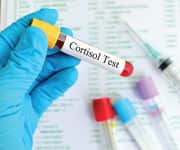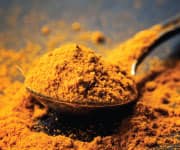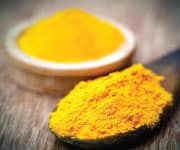Life Extension Magazine®
Stress causes destructive changes to our brain.
While we may feel anxious due to stress, those feelings are minor compared to damage done to our brain cells. Stress-induced brain changes often lead to anxiety or depression and worse.
Curcumin, a polyphenol derived from the turmeric spice plant, can reverse harmful brain changes induced by chronic stress.1 Curcumin also stimulates the formation of new brain cells and their connections—two processes that can prevent or mitigate symptoms of depression.2,3
Curcumin has been in use for nearly 4,000 years to treat or prevent various illnesses.2 New studies show that it can help protect mental health by combating stress-induced anxiety and depression.
This article describes preliminary laboratory research that led to human trials demonstrating the ability of curcumin to mitigate the adverse impact of stress on mental and physical health.
Controlling Stress at the Cellular Level

Researchers have come to realize that “emotional” or “psychological” stress negatively impacts our physical body, not just our sense of well-being.
Studies demonstrate close relationships between psychological stress and physically damaging effects.4-6
Animal studies of stress have been created that mimic the kinds of chronic, unpredictable stress that people now experience in their daily lives. These studies show that stress produces physical changes in the animals’ bodies, such as increasing the size and weight of the adrenal glands, particularly the portions that make the stress-response hormone cortisol. Elevations in blood levels of cortisol can have long-term deleterious effects, such as the belly-fat weight gain that stressed humans also develop.1,7,8
At the cellular level, stress inhibits our natural antioxidant systems, promotes oxidative damage, and injures energy-producing structures inside mitochondria, where cellular energy is managed.6,8
In addition, stressed animals develop performance, memory, and cognitive deficits in precisely the same ways that humans do.1,7 Chronic, unpredictable stress adversely affects production of brain-protective compounds. This may account for altered mental behaviors observed in response to stressful situations.1,7,8
Studies show that curcumin reverses these damaging changes to the body’s physical systems.
When given orally to rats, curcumin has been shown to restore the cortisol balance and the adrenal glands to their normal function, and to normalize the animals’ behaviors.1,7,8 In mice, curcumin improves both the oxidative and energy-restricting effect of stress while again restoring normal behavior.6 Recent studies show that curcumin can prevent the death of brain cells and promote new brain-cell connections, which become damaged from chronic stress.9
By protecting cellular structures from physical damage, curcumin is able to help remediate the longer-term impacts of stress, such as chronic anxiety and depression.
Let’s take a look at the studies.
Curcumin Addresses Anxiety
Animal studies of stress-induced anxiety have demonstrated that oral curcumin can significantly prevent anxiety-like behaviors and improve mobility—effects that are triggered by acute stressors such as sleep deprivation or restraints.10,11
Studies of the antidepressant effects of curcumin are even more abundant. Animal models of depression have been developed to test new, single-targeted drugs. But these models have proven useful in studies of natural supplements as well.
Curcumin has been shown to favorably affect the behavioral, biochemical, and neurochemical effects of depression in animal models. It has been shown to normalize depressive behaviors such as helplessness, to improve levels of mood-determining neurotransmitters such as dopamine and serotonin, and to inhibit the enzymes that break them down.12-15
People suffering from stress-induced depression have reduced levels of biochemicals that protect or enhance normal brain-cell activity. Curcumin appears capable of increasing the production of these protective biochemicals.3,15,16
In fact, curcumin is so potent against stress-induced anxiety and depression that it may help to lower the dose of prescription antidepressant drugs.13
Human Studies Validate Curcumin’s Anti-Stress Effects
A growing number of human studies are extending and validating what these animal studies have revealed.
For example, in a study of healthy, middle-aged people, taking an enhanced-absorption curcumin formula produced a wide array of health benefits, including reducing salivary amylase levels (a marker of acute stress), increasing scavenging of free radicals, and lowering blood markers of brain deterioration—all effects that would be expected to reduce the impact of stress in the brain.17
Work-related stress can be extremely harmful to health. A study published in 2016 demonstrated curcumin’s impact specifically in people suffering from occupational stress-related anxiety and fatigue.18
For the study, 60 adults with such occupational stress disorders were randomly assigned to take an enhanced-absorption curcumin formula, standard curcumin, or a placebo (all 500 mg twice daily) for 30 days. Compared with the other two groups, those taking the enhanced-absorption curcumin experienced significant improvements in quality of life, stress reduction, anxiety, and fatigue. These improvements correlated with reduced evidence of oxidative damage.
Another study focused on anxiety in obese people at risk for both anxiety and depression.19 Subjects took curcumin (1,000 mg/day) or a placebo. After 30 days, the curcumin-supplemented subjects experienced a significant reduction in mean anxiety scores.
What You Need to Know
 |
Curcumin Combats Anxiety and Depression
- Stress produces cellular and molecular damage to tissues throughout the body, particularly the brain.
- Stress-induced brain changes often lead to anxiety or depressive disorders, which themselves can contribute to additional stress.
- Drug therapy is only partially effective and comes with significant side effects.
- Curcumin is now showing remarkable stress-relieving, anti-anxiety, and antidepressant effects in laboratory studies.
- Human studies demonstrate that oral curcumin, particularly in enhanced-absorption formulations, can augment or even replace prescription drug therapy.
- Anyone suffering from the effects of depression or anxiety should consider adding enhanced-absorption curcumin in order to help combat the impact of chronic stress.
Curcumin’s Antidepressant Effects
Oxidative stress in the brain can lead to low-grade inflammation—and eventually to cellular dysfunction and death. These processes can manifest as symptoms associated with depression.4,5
Curcumin’s anti-inflammatory properties make it a strong candidate for use as a natural antidepressant.19-21 And unlike common antidepressant drugs, it has no known major side effects.22
In one study, curcumin (500 mg twice daily) was found to be significantly more effective than placebo at improving symptoms of depression (sleep disturbances, fatigue, feelings of worthlessness, diminished ability to concentrate, weight changes, thoughts of death or suicide, irritability, loss of interest, anxiety) in adults with major depressive disorder.21 This study showed that curcumin was the most effective in subjects with so-called atypical depression, a type of depression in which positive events can improve mood.
Just last year, researchers published a study examining curcumin’s effects on cognition and mood in healthy older adults. For this study, an enhanced-absorption form of curcumin (400 mg/day) was given to healthy adults aged 60 to 85.23 This research focused on both acute treatment (meaning a single dose) and chronic treatment (meaning treatment over a period of time) with curcumin vs. placebo.
One hour after a single dose, curcumin-supplemented subjects scored better on tasks requiring sustained attention and working memory—functions commonly impaired by depression. Continuous supplementation with curcumin for four weeks also improved scores on working memory and mood (general fatigue, calmness, contentedness, and fatigue induced by psychological stress). And when subjects took a single acute dose during the chronic supplementation period, it led to even further improvements in alertness and contentedness.23
Most recently, a meta-analysis study of curcumin and depression was published in early 2016 that evaluated the pooled results of six previous smaller studies.24 It showed that curcumin supplementation—especially in enhanced-absorption formulations—was significantly better than placebo at treating major depressive disorder. It also revealed that the effects appear greatest when given for longer periods of time, at higher doses, and to middle-aged people in particular.
Facts about Depression and Anxiety
 |
Major depression, once thought to be some sort of “character flaw,” is recognized as a debilitating psychiatric disorder. By the year 2020, major depression is expected to be the second most prevalent disease in humans.27 Even now, it is the leading cause of disability in the US for ages 15 to 44. Nearly half of those diagnosed with depression also have diagnosable anxiety disorders, further impeding their ability to function well.
Generalized anxiety disorder, or GAD, affects more than 3% of the US population. That’s 6.8 million adults, with women experiencing generalized anxiety disorder at twice the rate of men. The other anxiety disorders (social anxiety, panic disorder, post-traumatic stress disorder, obsessive-compulsive disorder, and others) affect millions more individuals.28
Drug treatment has become the mainstay of both antidepressant and anti-anxiety therapy, and drug companies are rushing to capitalize on newer combination formulas. But these drugs are associated with a wide array of side effects and interactions with other drugs and even foods, reducing their appeal for long-term use. Worse, about 30% of patients fail entirely to respond to drug therapy, while the remaining 70% have only partial responses.27
This gap in mainstream medicine has opened the door for natural alternatives to these dangerous and often ineffective drugs. Curcumin has been shown to have remarkable stress-relieving, anti-anxiety, and antidepressant effects in laboratory studies.
Curcumin Enhances Prescription Medications

Several studies have now shown that taking curcumin in addition to prescription medications leads to significantly greater improvement in depression and anxiety than taking prescription meds alone. This is a vital area of research, given the damage such drugs can cause to both short- and long-term functioning, and also considering their limited efficacy at treating symptoms.25,26
In one such study, researchers evaluated patients with major depressive disorder who were already taking standard antidepressant drugs. For six weeks, the patients either continued taking the standard treatment alone, or they took enhanced-absorption curcumin (1,000 mg/day) in addition to their prescription drugs.25 Both groups experienced reductions in depression ratings by the end of the study. However, the group taking their antidepressants plus curcumin showed significantly greater improvement on scales of anxiety and depression as well as on scores of cognitive and physical symptoms.
Another study evaluated depressed men between 31 and 59 years old who took curcumin (1,000 mg/day) or a placebo for 6 weeks while continuing their existing antidepressant regimen.26 By the end of the study period, the group taking the prescription drugs plus curcumin showed significant reductions in depression scores compared with those on standard drugs alone. The curcumin group also had significant reductions in markers of inflammation and stress, as well as enhanced levels of brain protective molecules.
Enhanced-Absorption Curcumin Formula
 |
Despite its powerful effect on myriad human disorders, curcumin is not readily absorbed from an oral dose.29 This has led to numerous attempts to enhance its absorption by combining the curcumin molecule with others that are more readily absorbed.
One of the most promising of the enhanced-absorption formulations is one in which curcumin is complexed with components of its native turmeric root, which are typically lost during purification. When this compound is administered orally in healthy adults, the absorption of curcumin into the bloodstream is nearly 7-fold that of curcumin alone.29
Given the superiority of enhanced-absorption curcumin, it seems prudent to seek such a preparation as part of a regimen that includes curcumin for its stress-reduction, antidepressant, and anti-anxiety effects.
Summary
Chronic stress has profound effects on our health and well-being. It is particularly associated with the development of anxiety and depression, both of which can be life-threatening conditions.
Drug treatment for anxiety and depression is far from adequate, and is fraught with potentially serious side effects. The natural polyphenol curcumin acts by multiple biochemical pathways to ease the impact of stress on brain cells, and to prevent or mitigate stress-induced anxiety and depression.
Curcumin may be used alone, or in combination with prescription medications, to relieve symptoms and improve quality of life. Anyone suffering from stress, depression, and/or anxiety should consider supplementing with an enhanced-absorption curcumin in order to emulate the findings emanating from these recent human studies.
If you have any questions on the scientific content of this article, please call a Life Extension® Wellness Specialist at 1-866-864-3027.
Editor’s Note:
Science continues to evolve, and new research is published daily. As such, we have a more recent article on this topic: Major Curcumin EnhancementReferences
- Xu Y, Ku B, Tie L, et al. Curcumin reverses the effects of chronic stress on behavior, the HPA axis, BDNF expression and phosphorylation of CREB. Brain Res. 2006;1122(1):56-64.
- Gomez-Pinilla F, Nguyen TT. Natural mood foods: the actions of polyphenols against psychiatric and cognitive disorders. Nutr Neurosci. 2012;15(3):127-33.
- Xu Y, Ku B, Cui L, et al. Curcumin reverses impaired hippocampal neurogenesis and increases serotonin receptor 1A mRNA and brain-derived neurotrophic factor expression in chronically stressed rats. Brain Res. 2007;1162:9-18.
- Hirose A, Terauchi M, Akiyoshi M, et al. Depressive symptoms are associated with oxidative stress in middle-aged women: a cross-sectional study. Biopsychosoc Med. 2016;10:12.
- Raza MU, Tufan T, Wang Y, et al. DNA Damage in Major Psychiatric Diseases. Neurotox Res. 2016;30(2):251-67.
- Rinwa P, Kumar A. Piperine potentiates the protective effects of curcumin against chronic unpredictable stress-induced cognitive impairment and oxidative damage in mice. Brain Res. 2012;1488:38-50.
- Xu Y, Lin D, Li S, et al. Curcumin reverses impaired cognition and neuronal plasticity induced by chronic stress. Neuropharmacology. 2009;57(4):463-71.
- Liu D, Wang Z, Gao Z, et al. Effects of curcumin on learning and memory deficits, BDNF, and ERK protein expression in rats exposed to chronic unpredictable stress. Behav Brain Res. 2014;271:116-21.
- Noorafshan A, Abdollahifar MA, Karbalay-Doust S, et al. Sertraline and curcumin prevent stress-induced morphological changes of dendrites and neurons in the medial prefrontal cortex of rats. Folia Neuropathol. 2015;53(1):69-79.
- Kumar A, Singh A. Possible nitric oxide modulation in protective effect of (Curcuma longa, Zingiberaceae) against sleep deprivation-induced behavioral alterations and oxidative damage in mice. Phytomedicine. 2008;15(8):577-86.
- Haider S, Naqvi F, Batool Z, et al. Pretreatment with curcumin attenuates anxiety while strengthens memory performance after one short stress experience in male rats. Brain Res Bull. 2015;115:1-8.
- Li YC, Wang FM, Pan Y, et al. Antidepressant-like effects of curcumin on serotonergic receptor-coupled AC-cAMP pathway in chronic unpredictable mild stress of rats. Prog Neuropsychopharmacol Biol Psychiatry. 2009;33(3):435-49.
- Kulkarni SK, Bhutani MK, Bishnoi M. Antidepressant activity of curcumin: involvement of serotonin and dopamine system. Psychopharmacology (Berl). 2008;201(3):435-42.
- Bhutani MK, Bishnoi M, Kulkarni SK. Anti-depressant like effect of curcumin and its combination with piperine in unpredictable chronic stress-induced behavioral, biochemical and neurochemical changes. Pharmacol Biochem Behav. 2009;92(1):39-43.
- Huang Z, Zhong XM, Li ZY, et al. Curcumin reverses corticosterone-induced depressive-like behavior and decrease in brain BDNF levels in rats. Neurosci Lett. 2011;493(3):145-8.
- Zhang L, Luo J, Zhang M, et al. Effects of curcumin on chronic, unpredictable, mild, stress-induced depressive-like behaviour and structural plasticity in the lateral amygdala of rats. Int J Neuropsychopharmacol. 2014;17(5):793-806.
- DiSilvestro RA, Joseph E, Zhao S, et al. Diverse effects of a low dose supplement of lipidated curcumin in healthy middle aged people. Nutr J. 2012;11:79.
- Pandaran Sudheeran S, Jacob D, Natinga Mulakal J, et al. Safety, Tolerance, and Enhanced Efficacy of a Bioavailable Formulation of Curcumin With Fenugreek Dietary Fiber on Occupational Stress: A Randomized, Double-Blind, Placebo-Controlled Pilot Study. J Clin Psychopharmacol. 2016;36(3):236-43.
- Esmaily H, Sahebkar A, Iranshahi M, et al. An investigation of the effects of curcumin on anxiety and depression in obese individuals: A randomized controlled trial. Chin J Integr Med. 2015;21(5):332-8.
- Rosenblat JD, Cha DS, Mansur RB, et al. Inflamed moods: a review of the interactions between inflammation and mood disorders. Prog Neuropsychopharmacol Biol Psychiatry. 2014;53:23-34.
- Lopresti AL, Maes M, Maker GL, et al. Curcumin for the treatment of major depression: a randomised, double-blind, placebo controlled study. J Affect Disord. 2014;167:368-75.
- Tizabi Y, Hurley LL, Qualls Z, et al. Relevance of the anti-inflammatory properties of curcumin in neurodegenerative diseases and depression. Molecules. 2014;19(12):20864-79.
- Cox KH, Pipingas A, Scholey AB. Investigation of the effects of solid lipid curcumin on cognition and mood in a healthy older population. J Psychopharmacol. 2015;29(5):642-51.
- Al-Karawi D, Al Mamoori DA, Tayyar Y. The Role of Curcumin Administration in Patients with Major Depressive Disorder: Mini Meta-Analysis of Clinical Trials. Phytother Res. 2016;30(2):175-83.
- Panahi Y, Badeli R, Karami GR, et al. Investigation of the efficacy of adjunctive therapy with bioavailability-boosted curcuminoids in major depressive disorder. Phytother Res. 2015;29(1):17-21.
- Yu JJ, Pei LB, Zhang Y, et al. Chronic Supplementation of Curcumin Enhances the Efficacy of Antidepressants in Major Depressive Disorder: A Randomized, Double-Blind, Placebo-Controlled Pilot Study. J Clin Psychopharmacol. 2015;35(4):406-10.
- Kulkarni S, Dhir A, Akula KK. Potentials of curcumin as an antidepressant. ScientificWorldJournal. 2009;9:1233-41.
- Available at: https://www.adaa.org/about-adaa/press-room/facts-statistics. Accessed September 6, 2016.
- Antony B, Merina B, Iyer VS, et al. A Pilot Cross-Over Study to Evaluate Human Oral Bioavailability of BCM-95CG (Biocurcumax), A Novel Bioenhanced Preparation of Curcumin. Indian J Pharm Sci. 2008;70(4):445-9.

